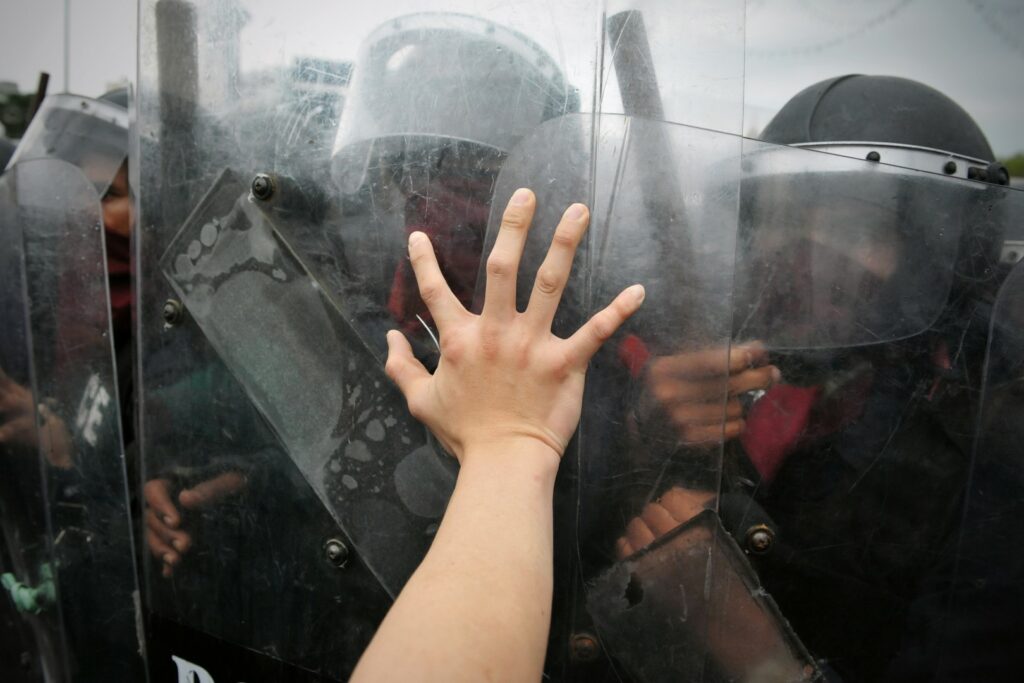COVID-19-related conspiracy theories: Belief in a time of pandemic
COVID-19-related conspiracy theories: Belief in a time of pandemic
Conspiracy theories are often associated with religious belief. However, susceptibility to conspiracy theories during the pandemic was determined by political polarisation.
This article was written in preparation for our round table on ‘A Pandemic of Polarisation’.
Conspiracy theories are often associated with religious belief. The famous philosopher of science Karl Popper called conspiracy theories “the secularization of religious superstition,”[1] where God is replaced with “the Learned Elders of Zion, or the monopolists, or the capitalists.”[2] This association became highly credible to many during the COVID-19 pandemic. For example, the anti-vaccine sentiments among Polish Roman Catholics have been explained away as their belief in “superstition and magic spells.”[3]
If one were to accept this account of conspiracy and belief, then conspiracy theories appear to fulfil some of the psychological needs once addressed by religion. With the decline of traditional religion in Europe and the larger West, people have sought to impose “a sense of order and agency upon the world”[4] with the increasing use of conspiracy theories.[5]
Is belief the source of conspiracy theories?
More nuanced readings of this relationship between conspiracy and belief offer a different account, however. A 2021 research on Spain, one of the first European countries to be severely affected by the COVID-19 pandemic, highlighted that susceptibility to conspiracy theories during the pandemic was determined not by religious belief but by political polarisation.[6]
When facing the uncertainties of the pandemic, people made decisions primarily based on whether they trusted the government or not. In the case of Spain, this public trust was determined by a specific political polarisation in the country. While left-wing voters in Spain trusted public authorities more during the pandemic, right-wing voters trusted their religious beliefs, such as “God answering prayers”[7] and “the existence of an afterlife.”[8] The research concluded that pre-existing political polarisation was the key determinant of how people reacted during the pandemic.[9]
The role of public trust and political polarisation has proved to be similarly true for many other countries in Europe. Many of the countries with the lowest levels of vaccination rates in Europe also had the lowest levels of trust in government. Bulgaria, Romania, and Slovakia – countries with the lowest vaccination rates in Europe – also have one of the lowest levels of trust in government, at 22%, 31%, and 21%, respectively.[10] University of Pennsylvania academics on Eastern Europe, Professors Kristen Ghodsee and Mitchell A. Orenstein, together explain that Eastern Europe’s low rates of public trust are because of the lingering effects of decades of communist rule and its collapse.[11] After 1989, many of the region’s countries underwent deep post-communist recessions, and with it, a profound erosion of public trust.[12]
The role of belief
One has to acknowledge that in many of these countries, religious belief still appears to play a role. The Orthodox Church in Bulgaria, for example, has refused to endorse mass vaccination and instead asked for believers to rely on the sacredness of the body of Christ.[13] This again reinforces the case, as in the case of Spain, that religious institutions may offer trustworthy guidance in contexts of distrusted public institutions. It appears then that people who distrust public institutions are likely to be suspicious of them. Instead of seeking guidance and services from the government, they may hold conspiracy theories about it.
It can be argued, therefore, that conspiracy theories are often the result of a preexisting set of choices, often polarised, that are presented to us in a complex, unpredictable world. As David G. Robertson of the Open University, explains, religious belief is arguably only one of a number of commitments that influence the choices we finally make.[14] During the COVID-19 pandemic, the choices presented to us have been distinctly political in nature because politics has played an unusually heightened role. As Faisal Devji of the University of Oxford explains, the pandemic represents the “state’s greatest moment of authority”[15] over public life in recent history.
Can beliefs be used to fight conspiracy theories?
A key question that arises at this stage is whether the role of belief can be harnessed to fight conspiracy theories.
National COVID-19 emergency responses across the world, including in Europe, made a key mistake of not recognising that the taking up of new health-related knowledge is an active cognitive process. As Estes’s research on ‘information processing theory’[16] suggests: to inform themselves about any disease (in this case COVID-19) and about ways to protect themselves, people actively select knowledge. Their context, emotions, and selective attention influence this selection.[17] This active and personalised mode of selection can introduce a potential selection bias because of which people may seek knowledge that primarily confirms the beliefs they already hold, and ignores or discards information that contradicts these beliefs.[18]
This highlights the risks presented by belief and also explains why people accept misinformation, such as conspiracy theories, as the truth. Misinformation can reinforce false beliefs and even create a false social consensus about misinformation. As the WHO observes, the inability of the emergency responses to COVID-19 to account for the role of beliefs strongly suggests a need for policy that supports people to not only know about healthy behaviours but also “believe in” them.[19]
It is, therefore, as Champion and Skinner argue, essential to go beyond knowledge and use policy to address people’s beliefs about COVID-19.[20] And most significantly, not just their beliefs about religion but their other ‘beliefs’ (such as political or other health-related).
In other words, if people’s underlying beliefs are adequately understood and addressed, one can more successfully dispel, or even prevent, conspiracy theories. In the case of the COVID-19 pandemic in Europe, one key set of beliefs that needs to be addressed is people’s polarised beliefs about government and politics.
Sources
[1] Like religion, conspiracy theories are more complex than just a set of strongly held beliefs | USAPP
[2] Ibid.
[3] Anti-vaccine sentiment rife in Poland | Europe | News and current affairs from around the continent | DW | 31.12.2020
[4] Chapter 4 Are Conspiracy Theories a Surrogate for God?
[5] Ibid.
[6] Polarization of beliefs as a consequence of the COVID-19 pandemic: The case of Spain
[7] Ibid.
[8] Ibid.
[9] Ibid.
[10] Why Won’t Eastern Europeans Get Vaccinated? by Kristen Ghodsee & Mitchell A. Orenstein – Project Syndicate
[11] Why Won’t Eastern Europeans Get Vaccinated? by Kristen Ghodsee & Mitchell A. Orenstein – Project Syndicate
[12] Ibid.
[13] Ample supplies, anti-vax lies: Why Bulgaria has the EU’s lowest vaccination rate | The Independent
[14] Ibid.
[15] Faisal Devji On Black Lives Matter With Raza Rumi
[16] Estes W. K. (2014) ‘Handbook of Learning and Cognitive Processes (Vol. 5): Human Information Processing’. Psychology Press, New York.
[17] Ibid.
[18] Stephan Van den Broucke (2020) ‘Why Health Promotion Matters to the COVID-19 Pandemic, and Vice Versa.’ Health Promotion International, Volume 35, Issue 2, April 2020, Pages 181–186.
[19] WHO (2021) Policy Paper: Health Promotion Responses to the COVID-19 Pandemic
[20] Champion V. L., Skinner C. S. (2008) The health belief model. In Glanz K., Rimer B. K., Viswanath K. (eds), Health Behavior and Health Education: Theory, Research, and Practice. Jossey-Bass, San Francisco, CA, pp. 45–65






